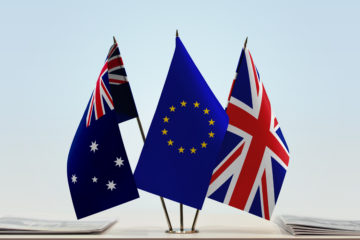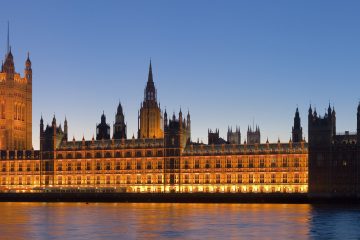#Indiref2: Twitter and the Potential for a Second Scottish Independence Referendum
On Twitter, conversations around Scotland’s independence, dampened momentarily by a failed referendum in 2014, have been reinvigorated with the advent of Brexit. This article examines how public sentiment towards Scottish independence varies across the United Kingdom’s four constituent nations (England, Wales, Northern Ireland, and Scotland) by analyzing tweets made in January of this year in lead up to Brexit. Perhaps not surprisingly, the majority of tweets totaling 4,462 (71.4%) on the subject were sent from the mainland of Scotland. 1,387 (22.2%) tweets were sent from England, whereas Wales and Northern Ireland have 286 and 212 tweets respectively, collectively accounting for less than 6% of the all tweets (see Figure 1). Despite the significant difference in the volume of tweets, the …

What the History of Australian Independence can tell us about Britain’s Journey ahead
Debates over Brexit have been “dominated by a yearning for restoring UK sovereignty”. The Brexit vote during June 2016 was declared as an independence day by key members of the leave campaign. Similarly, such sentiments have been used about the exit day on which the UK is to leave the EU under the European Union (Withdrawal) Act Independence is often perceived as one decisive moment – a clean break with the past and a new beginning. However, this article posits that independence might be better thought of as a gradual process, characterized by both change and continuity. Taking the example of the development of Australia’s foreign policy post-federation, the article showcases that de jure sovereignty does not automatically or immediately result in de facto …
Q&A with “A Second Chance” filmmaker Rex Bloomstein: the state of prison rehabilitation in the UK
You probably don’t think too much about the person who copies your keys at the local shop, repairs your shoes or takes your new passport photo. But if that shop is owned by the Timpson Group, chances are their management has. Timpson is one of a few employers in the UK actively recruiting and training people within prisons to work in their shops, which include Max Spielmann, Timpson Locksmiths and Snappy Snaps. Under an effort by CEO James Timpson, the company currently employs about 600 ex-offenders. This training and employment scheme is the subject of A Second Chance, a new full-length documentary, directed by filmmaker Rex Bloomstein and co-produced with Justin Temple. Bloomstein, who has made films on the criminal justice system since the 1970s, …

Can Europe Make It? The EU After Brexit
Brexit has weakened populists on the continent? This is wishful thinking. No longer willing to leave the EU, instead populists are determined to take it over. Brexit is a moving target. Each time we think we have a deal, the British House of Commons decides to re-think. It’s like the famous passage from T.S. Eliot: “Time yet for a hundred indecisions/And for a hundred visions and revisions,/ Before taking a toast and tea.” Boris Johnson expected the Parliament to approve the exit deal he reached with the EU. Instead, the Parliament voted for an amendment tabled by a Tory MP, Sir Oliver Letwin. The amendment withholds approval of the deal, until the legislation to enact it is safely passed – …

Star Wars and Brexit: The “Rebel Alliance” leaves its mark
It is a period of civil war. Rebel politicians, striking from hidden Westminster offices, have won their first victory against the evil Brexiteer Prime Minister. During the battle, Rebel MPs manage to steal control of the Commons… The so-called “rebel alliance” of pro-EU MPs secured an important victory on September 4 of this year in their quest to prevent a no-deal Brexit: parliament passed the Benn-Burt Bill, which requires Prime Minister Boris Johnson to seek a four-month extension of Article 50 if parliament has not agreed to a no-deal Brexit or a withdrawal agreement by October 19. When the result of the vote was announced, protestors outside of the House of Commons, celebrated by playing the Star Wars theme tune. …

The Fixed Term Parliament Act: A Recipe for Constitutional Crisis and Prorogation?
In Introduction to the Study of the Law of the Constitution, A. V. Dicey states: “The necessity for dissolutions stands in close connection with the existence of Parliamentary sovereignty… Where Parliament is supreme, some further security for such harmony is necessary, and this security is given by the right of dissolution, which enables the Crown or the Ministry to appeal from the legislature to the nation.” Elsewhere, Dicey refers to examples of dissolution in 1784 and 1834 as examples of such a convention and argues this is a democratic necessity in a sovereign parliament, to argue that “the Cabinet, when supported by the Crown, and therefore possessing the power of dissolution, can defy the will of a House of Commons …

Why Brexit Won’t Change Sinn Féin’s Abstention from the UK Parliament
Irish Republican abstentionism from the British Parliament has a long and complicated history. Arguably, the last few decades since the Good Friday Agreement have been some of the least consequential or controversial since the practise began. The 2017 election, the DUP’s entry into a confidence & supply agreement with the Conservative Party, and the backdrop of a Parliament unable to act upon the result of the Brexit referendum, has renewed interest in it. Sinn Féin’s decision not to take their seven seats in Westminster is causing consternation, particularly from those who wish to see the party enter Parliament and derail a no-deal or ‘hard’ Brexit. While debating the merits of abstentionism is an argument as old as the practise itself, …

Lacking Substance: Drugs and the Tory Leadership Contest
Revelations about Michael Gove’s past cocaine use have redefined the Tory leadership contest. Despite the ongoing Brexit process, growing economic uncertainty, and the Conservative’s historic defeat in the recent European elections, the debate has been dominated by illegal drug use. Seven of the ten candidates have admitted taking cannabis, cocaine, and even opium – though frontrunner Boris Johnson has stayed conspicuously quiet in the light of past statements. Even Theresa May has faced questions about her history with drugs. The problem is not that politicians are talking about drugs, but what they are talking about. Drugs are an important issue, and any future Prime Minister should have a thought-out, evidence-based and proactive stance on drugs – including on issues like …









